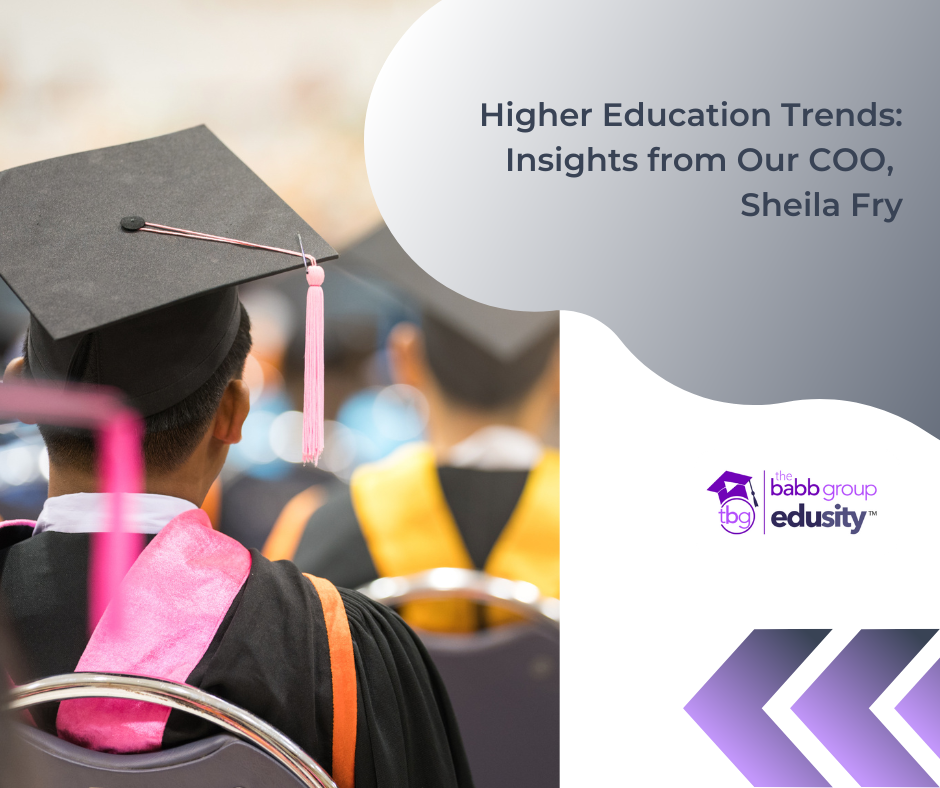As institutions discuss the challenges and opportunities of higher education, we sat down with our Chief Operating Officer, Sheila Fry, who shared what she’s seeing and hearing from our partner schools around the country. Hear what’s trending at successful schools including microcredentials, online programs, flexible learning options, and workforce development.
Watch the full interview with Sheila here:
Shifting Learning Management Systems (LMS)
Fry emphasizes that many institutions are transitioning from one LMS to another. The reasons behind this shift are multifaceted: accessibility, cost considerations, and the need to expand programs or accommodate new capacities. However, such transitions come with challenges. Institutions must navigate technical complexities and be prepared to train students and faculty on the new tools. It’s also essential to rely on experienced instructional designers to ensure a smooth migration, and maintain continuity for both faculty and students.
Adding New Programs with Differentiating Factors
Fry discussed how schools are being thoughtful about adding new programs by listening to students and the people in their school communities. Fry says the schools who are success are asking, “Who are they trying to target? Is it the working adult? Is it the traditional student? And then designing those programs specifically to meet those needs and those requirements.” Some existing programs may not be meeting the demand they once did, while other areas experience increased interest. Successful institutions are those that proactively explore and develop innovative programs aligned with market needs.
Whether it’s working adults seeking career advancement or traditional students pursuing degrees, institutions must tailor their programs to meet specific needs. Sheila adds, “How can we be different?” In a competitive market, standing out requires creativity, innovation, and a clear value proposition.
Read more: Leading the Way: Innovations Driving Higher Education Success
Renewed Emphasis on Accessibility and Inclusion
Fry underscores the importance of accessibility and inclusion when updating LMSs and revising courses. Institutions must ensure that their courses are accessible to all students, including those with disabilities. This involves making content compatible with screen readers, creating inclusive environments, and addressing diverse learning needs. Whether revising existing courses or designing new ones, accessibility remains a critical consideration.
Progress in Online Learning
Online education continues to be a focal point. Fry notes that online learning is where the future lies. Institutions must invest in robust online platforms, provide comprehensive documentation, and offer a seamless digital experience. As the world becomes increasingly interconnected, institutions that excel in online education will thrive.
Workforce Training and Development
The intersection of education and employability is crucial. Fry emphasizes the need for workforce training and development. She talks about the demands of the modern adult learner. “They want those applicable skills. Maybe they don’t have time to dedicate or the financial basis to dedicate to a regular traditional degree, but they have great skills. They want to enhance one certain part of what they’re doing. They want to be able to get a certificate. They want to show that they have skills in a certain area. So being able to utilize and expand on micro-credentials allows them to do that, and it allows them to tie in those specific workforce skills.” Institutions should align their programs with industry demands, emphasizing practical skills and job readiness. By doing so, they empower students to succeed in their careers.
Keeping Courses Relevant
Finally, Fry stresses the importance of course revisions. Even if courses were once fantastic, they must evolve to remain impactful. Outdated content, irrelevant topics, and obsolete textbooks hinder student engagement. Fry says, “We need to make sure that we’re including aspects that are relevant, that are job-focused. This is a good opportunity now to tie in job skills and to do those things. So, it’s an opportunity to really explore and enhance and expand and make sure that now you’re making an inclusive environment and that everything is accessible.” Fry encourages institutions to incorporate job-focused skills and stay abreast of industry developments. By doing so, they create an inclusive environment that prepares students for the real world.
Institutions that embrace these trends through LMS transitions, innovative programs, or a commitment to accessibility will thrive. As Fry aptly puts it, “It’s an opportunity to explore, enhance, and expand.”
You might also like:
Angela Britcher
Latest posts by Angela Britcher (see all)
- Enhancing First-Year Experiences in Higher Education - August 1, 2024
- Enhancing Education with Virtual Reality: A Hands-On Approach - June 27, 2024
- Higher Education Trends: Insights from Our COO, Sheila Fry - June 13, 2024
